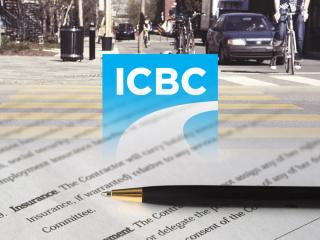Full Decision
Heard: April 23, 2019
Decision released: May 3, 2019
Headline: No trial costs for plaintiffs’ lawyer where set-off results in no net recovery for plaintiff
Summary:
This decision arises from a motion brought by the law firm which represented the Plaintiff at trial, LoFranco Corriero, subsequent to a trial and costs decision rendered in a personal injury trial. On the motion, the Plaintiff’s lawyer sought a charging order against monies awarded to the Plaintiff as a first priority ahead of any amounts entitled to the Defendants by way of set-off, where significant costs were awarded to the Defendants based on Rule 49 offers made before trial. The motion judge held that since the set-off ordered by the trial judge resulted in the Plaintiff owing money to the Defendants, there was no property or fund created on which a charging order could be made.
The Trial Verdict:
The Plaintiff Mr. Bosnali sued the Defendants in relation to injuries arising from a motor vehicle accident which occurred on November 28, 2007. The Plaintiff sought a significant economic loss recovery based on loss of earnings and competitive advantage.
The Jury awarded the Plaintiff as follows:
Generals: $100,000
Housekeeping: $42,500
Med Rehab: $10,000
Total: $152,500
The Trial Judge, Justice Tzimas J. in the decision of Bosnali v. Michaud, 2017 ONSC 3943, then took into consideration the deductible, the right of the Defendants to obtain credit for any accident benefits paid to the Plaintiff, pre-judgement interest and Rule 49 offers exchanged between the parties. The most detrimental of this analysis was very significant Rule 49 offers made by the Defendants. Four offers were made by the Defendants in total, the first to surpass the jury verdict, was made nine months prior to trial in the sum of $310,000 on April 14, 2016 and the second of $550,000 was made on December 13, 2016.
The result of the final order which set off costs of the Defendants in the amount of $318,487.02 against the Plaintiff’s trial award (net of the deductible and accident benefits credits, inclusive of interest and the Plaintiff’s costs up to the date of the offer), was that the Plaintiff owed to the Defendants $18,596.60.
The Motion:
LoFranco Corriero who represented the Plaintiff at trial, subsequently brought a motion seeking a first charge on the monies awarded to the Plaintiff at trial in priority of any right of set-off of the Defendants costs awarded.
The Plaintiff’s lawyer had issued a bill to the Plaintiff for their representation of Mr. Bosnali at trial in the sum of $339,839.31. While Mr. Bosnali originally disputed the bill, he failed to take critical steps to preserve his right to contest the bill before the motion was ultimately heard and Justice Petersen deemed the bill accepted by the Plaintiff. The Plaintiff had filed for bankruptcy before the motion was heard.
Case Law:
Justice Petersen, citing the Court of Appeal in Taylor v. Taylor, 2002 Canlii 44981 (ON CA) 60 O.R. (3d) 138 at para. 28, recognizes that section. 34(1) of the Solicitors Act “codifies the inherent jurisdiction in equity to declare a lien on the proceeds of a judgment where there appears to be good reason to believe that the solicitor would otherwise be deprived of his or her costs.”
Justice Petersen then set out the test for a charging order as stated in Bilek v. Salter Estate, [2009] O.J. No.4454 (Ont. S.C.J.) at para 11. It requires the solicitor to demonstrate that:
i) The property is in existence at the time the order is granted;
ii) The property was recovered or preserved through the instrumentality
of the solicitor; and
iii) There is some evidence that the client cannot or will not pay the
lawyer’s fees.
Justice Peterson citing King Road Paving and Landscaping Inc. v. Plati, 2017 ONSC 7675 (CanLII) acknowledged that a damage or cost award constitutes funds or property over which a solicitor may claim a charge.
Analysis:
Justice Petersen ruled that LoFranco Corriero had failed to meet the first two prongs of the test for a charging order, though the third prong was met.
Justice Petersen held that the jury verdict is not the origin of the property which would come into existence, but rather it would be the ultimate judgement of the trial judge which would create such property. Since the trial judge’s final order concluded with a requirement that the Plaintiff pay to the Defendants a sum of $11,675.59, the only property created by the Judgement belonged to the Defendants, not the Plaintiff.
Justice Petersen distinguished the Supreme Court of Canada decision of Wright v. Bell, [1895] SCC vol.XXIV 656 a case in which a solicitor claimed priority of funds arising from the sale of land belonging to an estate, by finding that: there was no set-off order in Wright v. Bell; that the case predated Rule 49 of the Rules of Civil Procedure applicable in the case at bar; and that there was no dispute in that case about whether a fund actually existed. The Judge similarly distinguished the case of Budinsky v. The Breakers East Inc., (1993) 1993 CanLII 5442 (ON SC), 15 O.R. (3d) 198 (Ont. Gen. Div.) on the basis that there was no dispute that a fund existed in that case either.
Justice Petersen rejected any notion that the terms of the final order in the case were severable, instead holding that the order must be read in its totality. Importantly the judge held that to do so would undermine the very purpose of Rule 49 offers, by undermining consequences to a Plaintiff who does not accept an offer more favourable than the judgement obtained.
Justice Petersen endorsed and cited the reasoning of Justice Pardu in a similar case, Poulin v. Pettitt, [1992] O.J. No.1387 (Ont. Gen. Div.), wherein Justice Pardu held at para 21:
The purpose of granting a solicitor a lien upon the fruits of an action is to recognize that it is unfair for a party to enjoy the results of a solicitor’s work without paying the solicitor’s account incurred in achieving the result. Where a client derives no net benefit from the solicitor’s work, that rationale is not compelling.
The defendant will suffer substantial prejudice if he is not permitted to set-off the money owed to the plaintiff by him against the funds owed to him by the plaintiff. The assertion of a solicitor’s lien [over the damages and costs awarded to the plaintiff] may render illusory the cost consequences of offers to settle and in my view that result would be undesirable.
Justice Petersen held that to deprive the Defendants of their costs on the basis that the Plaintiff would be liable to the Defendant irrespective of a charging order in priority for the Plaintiff’s solicitor undermines the incentive that Rule 49 creates for litigants to make reasonable offers to settle cases in advance of trial.
Disposition:
Justice Petersen dismissed LoFranco Corriero’s motion on the basis that the Firm had not established that there was any property left on the ultimate disposition of the trial judge on which a charging order could be made. Costs were awarded against the Firm, since the Firm appeared on its own behalf, payable to the Defendants in the sum of $7,250 within 30 days.
This decision serves as an important reminder that personal injury lawyers should seriously consider trial offers against the risk of an unpredictable trial verdict, and that the consequences of such offers will be borne not only by the client, but also by the lawyer who proceeds to trial in the face of significant trial offers made by Defendants.














